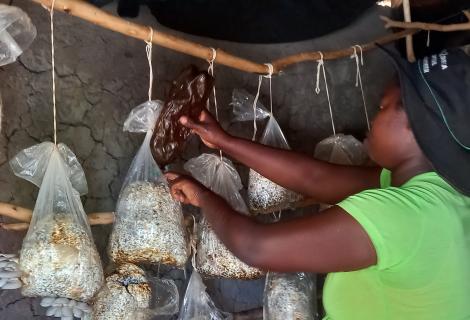Youth in Binga demand the provision of water in Lubimbi community.

As the water crisis continues to deepen in Binga district due to climate change-induced droughts, young people in Lubimbi Ward 20 are demanding water as their human right from Binga Rural District Council. The water crisis has affected their food systems and everyday lives. Binga district is one of ActionAid Zimbabwe’s (AAZ) Local Rights Program (LRP)areas with Lubimbi Ward 20 falling under the AAZ’s Strategic Partnership Agreement (SPA) 2 implementing wards. The area falls within the agroecological zone 5 which receives low rainfall making it more susceptible to the impacts of climate change particularly the lack of water. The community is heavily dependent on rain-fed agricultural economic activities. Recurrent droughts and unpredictable rainfall patterns have made the food security situation dire for the communities in these areas.
AAZ has been implementing resilience building projects and awareness-raising trainings in the Zambezi Valley through the Zimbabwe Resilience Building Fund and Zimbabwe Agricultural Growth Programme consortium projects. The work continues through the SPA 2 project that seeks to influence the creation of an enabling environment for the implementation of feminist and green economic alternatives that will improve livelihoods and build youth especially young women’s resilience to climate change-induced shocks and stresses. To this end, Basilwizi Trust, the implementing partner for SPA 2 project with support from AAZ trained 33 young people in Lubimbi in April 2023 on Gender Responsive Public Service (GRPS), which stresses demanding accountability on public service delivery, organizing for collective action and engaging the duty bearers on issues affecting them and their communities.
In March 2023, 25 young people were trained on various projects such as mushroom farming, growing small grains, and transforming agriculture systems through the use of agroecology principles. As a result, these trainings gave young people the impetus and drive traction to demand for water provision in Binga. The drying up of the weir dam which was constructed by the Chibuyu villagers as their source of water for watering the mushrooms has exacerbated the situation for the community. Mushroom farming is one of their resilience-building projects and within two months, they managed to earn USD 40.
In 2019 AAZ conducted a research and published a report to document the lived realities in the LRPs regarding the provision of Gender Responsive Public Services whose evidence points out that the discord between policy and practice translates to heavy unpaid care work burden on women. Driven by the Country Strategy Plan 2018-2023, AAZ’s programme approach is hinged on one of its pillars to build collective power through partnerships and collaborations, AAZ established local partnerships that continue supporting young people to flourish in bringing out critical community issues such as the need to address Unpaid Care Concerns through the provision of water as a gender responsive public service automatically translates to the recognition, reduction and redistribution of Unpaid Care Work for women in the community. This work has not only strengthend AAZ’s footprint in the local rights programs but has is also moonlighting on one of the organisation’s primary priorities centred on ensuring increased civic participation and state accountability for the redistribution of resources and delivery of gender responsive public services.
The drying up of the weir dam, beginning of May 2023 heavily impacted the youth’s livelihood project, forcing them to walk 3km to get water from Lubimbi High School for their mushroom, but the young people did not bury their heads in the sand. It was reported that on the 22nd of May the Lubimbi High borehole pipes burst, negatively affecting the project. The other nearest borehole that they rely on is 6 km away which increases the burden for the Lubimbi Youth Hub to access water for household use and dependent food security and resilience building projects such as mushroom farming. The mushrooms went for 19 days with limited water supply, which resulted in wilting- negatively impacting their livelihood source.
To voice their concern, Pretty Tshuma who is part of the Lubimbi Youth Hub, on 2 June 2023, wrote a letter, addressed to Binga Rural District Council (BRDC) and District Development Fund (DDF) to fix the Lubimbi borehole pipes. The letter was handed over to the ward Councillor, Luyando Muleya who, each Thursday travels to Binga Rural District Council to present their community development issues. The Lubimbi High School borehole was fixed on the 10 of June, however, it was too little too late as the community remains with the challenge of reviving the dry mushrooms and the attendant economic and food security losses.